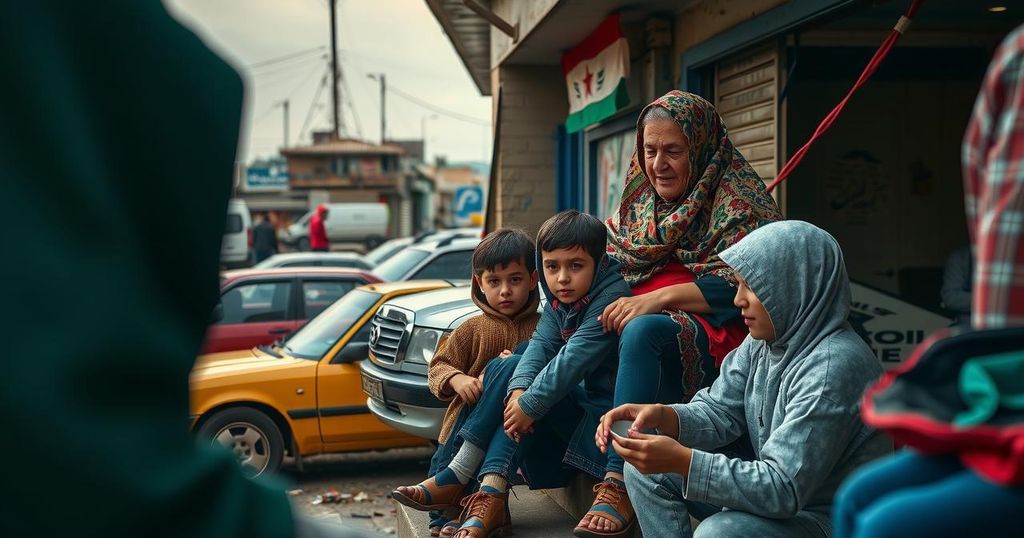Syrians in Lebanon Confront Double Displacement Amid Escalating Conflict
Syrians in Lebanon face new displacement due to intensified conflict between Hezbollah and Israel, with over 1.2 million people forced from their homes. Many encounter a dilemma between returning to an unsafe Syria or remaining in Lebanon, where they face poverty and hostility. UNHCR notes double displacement exacerbates vulnerability, with ongoing challenges in accessing basic services. The urgent need for humanitarian assistance and equitable policies is emphasized amid this crisis.
As the ongoing conflict in Lebanon intensifies, Syrians who had initially fled to Lebanon are facing a new crisis of double displacement. Over a million individuals have been forced from their homes due to the escalating violence between the Israeli military and Hezbollah following a series of attacks that began on October 8, 2023. Many Syrians, fearing conscription or arrest if they attempt to return to Syria, grapple with precarious decisions amid worsening living conditions that include deepening poverty and rising hostility from Lebanese natives. In just a short span, the United Nations High Commissioner for Refugees (UNHCR) indicated that approximately 34,000 Syrians have been reported as secondarily displaced since the latest onset of violence in October. The armed exchanges between Hezbollah and Israel, including significant military actions by the Israeli forces targeting Hezbollah assets, have exacerbated the already dire situation for these refugees. More than 1.2 million people have been displaced in Lebanon since the conflict escalated over a year ago, provoking painful memories for both Lebanese and Syrian populations who have endured extensive wars and crises in the past. The societal dynamics are fraught; Lebanese civilians remember the ruptures of previous conflicts, while Syrians still carry the scars of their ongoing civil war. As they confront the grim reality of their situation, voices like Lisa Abou Khaled, a spokesperson for UNHCR, articulate the increasing vulnerabilities facing these refugees. She noted, “Refugees who have fled their homeland in search of safety and security are now facing the reality of being displaced once again in Lebanon due to ongoing hostilities. This double displacement exacerbates their vulnerability.” Despite the dire circumstances, many displaced Syrians choose to remain in Lebanon rather than risking dangerous sea crossings to Europe, as the situation in Syria presents insurmountable risks. They report significant difficulties accessing basic necessities such as work, housing, and essential services amid Lebanon’s deteriorating economic landscape. Cases have emerged of Syrian families being turned away from local municipalities under claims of prioritizing displaced Lebanese families and barriers established due to overcrowding and purported security concerns. Organizations like MedGlobal express alarm at the growing number of refugees surviving in makeshift camps or even on the streets. This has become acute with winter approaching, heightening the urgency for humanitarian support. The scrutiny from local authorities has led to controversial claims of systemic discrimination against Syrians amidst Lebanese political rhetoric urging for their repatriation, despite widespread acknowledgment from human rights entities asserting that conditions in Syria remain unsafe for returnees. Officials such as Lebanon’s caretaker minister of social affairs have defended against allegations of bias while maintaining that the challenges faced by displaced populations require a unified humanitarian response. Humanitarian agencies, including UNHCR, are actively working to establish a comprehensive emergency shelter strategy to address the immediate concerns of those displaced. In conclusion, the plight of Syrians in Lebanon reflects a complex tapestry of ongoing conflict, historical trauma, and present vulnerabilities. As they navigate their precarious existence amidst Lebanon’s turmoil, humanitarian assistance remains pivotal in ensuring their dignity and safety. The UNHCR and other organizations continue to advocate for equal access to essential services amid this unprecedented crisis.
The ongoing conflict in Lebanon has led to the secondary displacement of many Syrian refugees who initially fled their homeland due to the civil war that has been ongoing since 2011. Lebanon has been hosting around 1.5 million Syrian refugees, and the current situation has intensified since the escalation of hostilities involving Hezbollah and the Israeli military from October 2023. The repercussions of these hostilities have forced many refugees to reassess their safety and living conditions in Lebanon, a country already grappling with a severe economic crisis.
The dual displacement faced by Syrians in Lebanon underscores a humanitarian crisis that necessitates immediate attention. The continuous violence not only interrupts their search for safety but also compels them into precarious living conditions. Urgent humanitarian aid and policy interventions are critical to ensure that these individuals are treated with the dignity and respect they deserve, as they navigate the complexities of war and displacement.
Original Source: www.arabnews.com




Post Comment